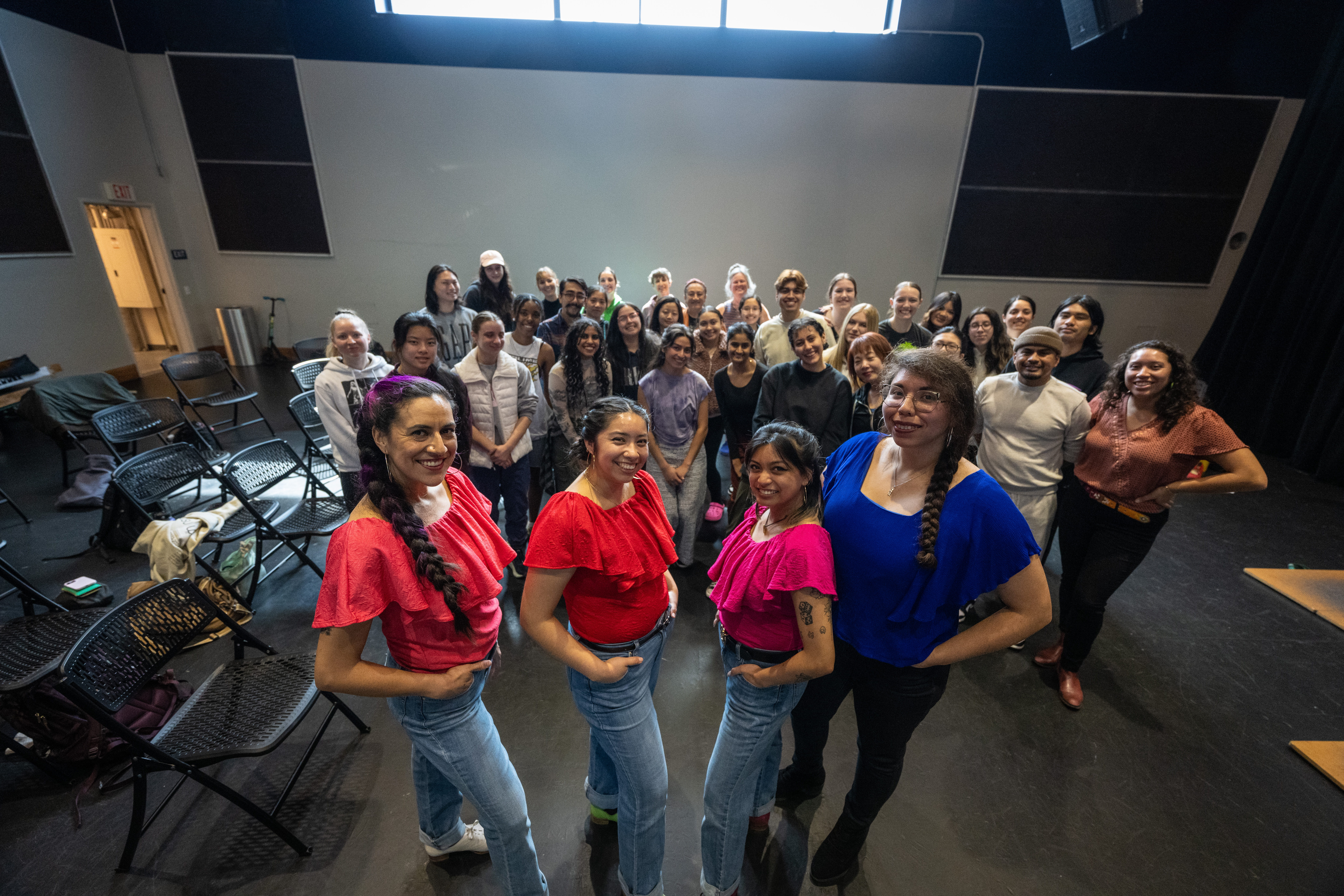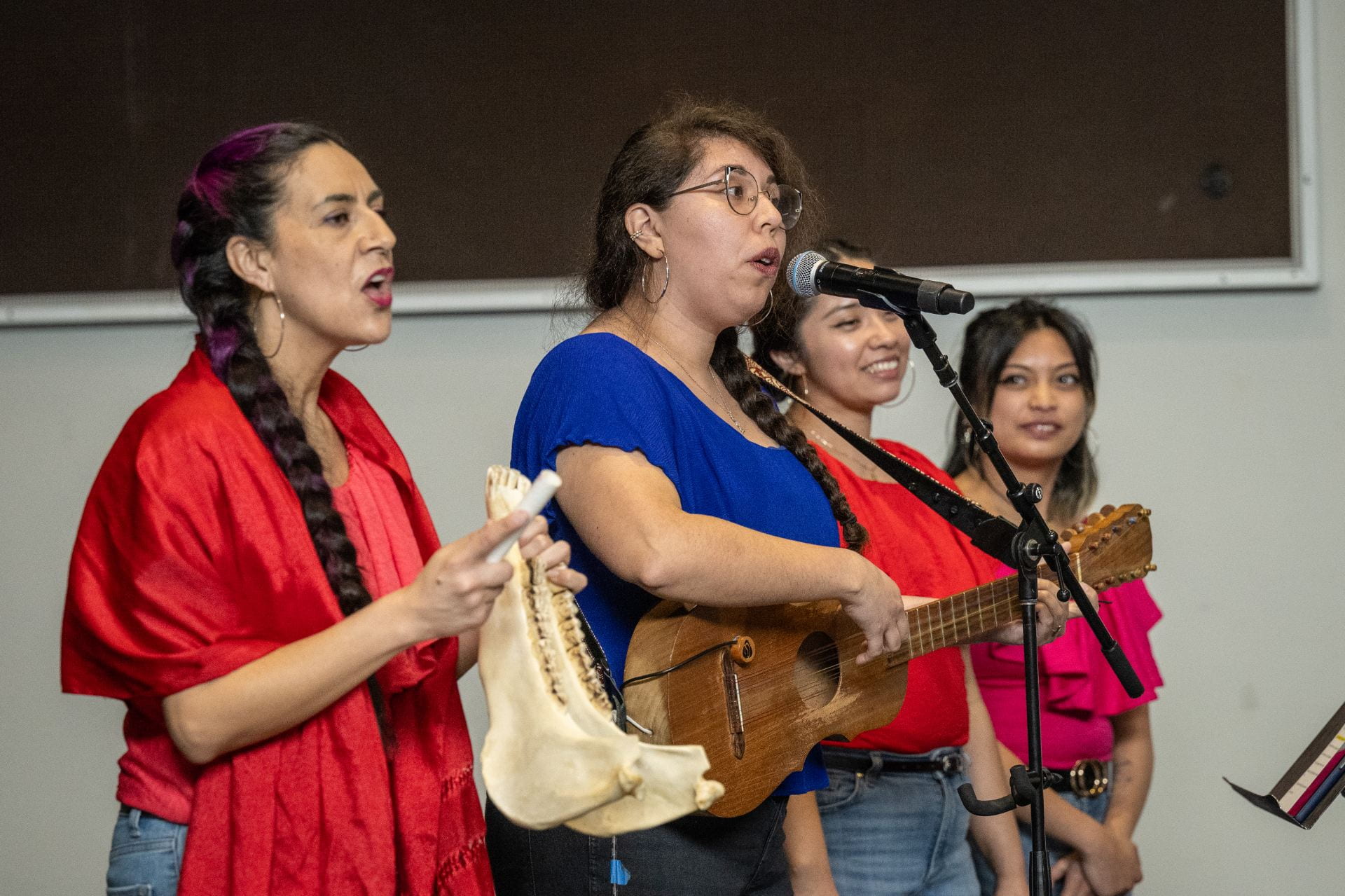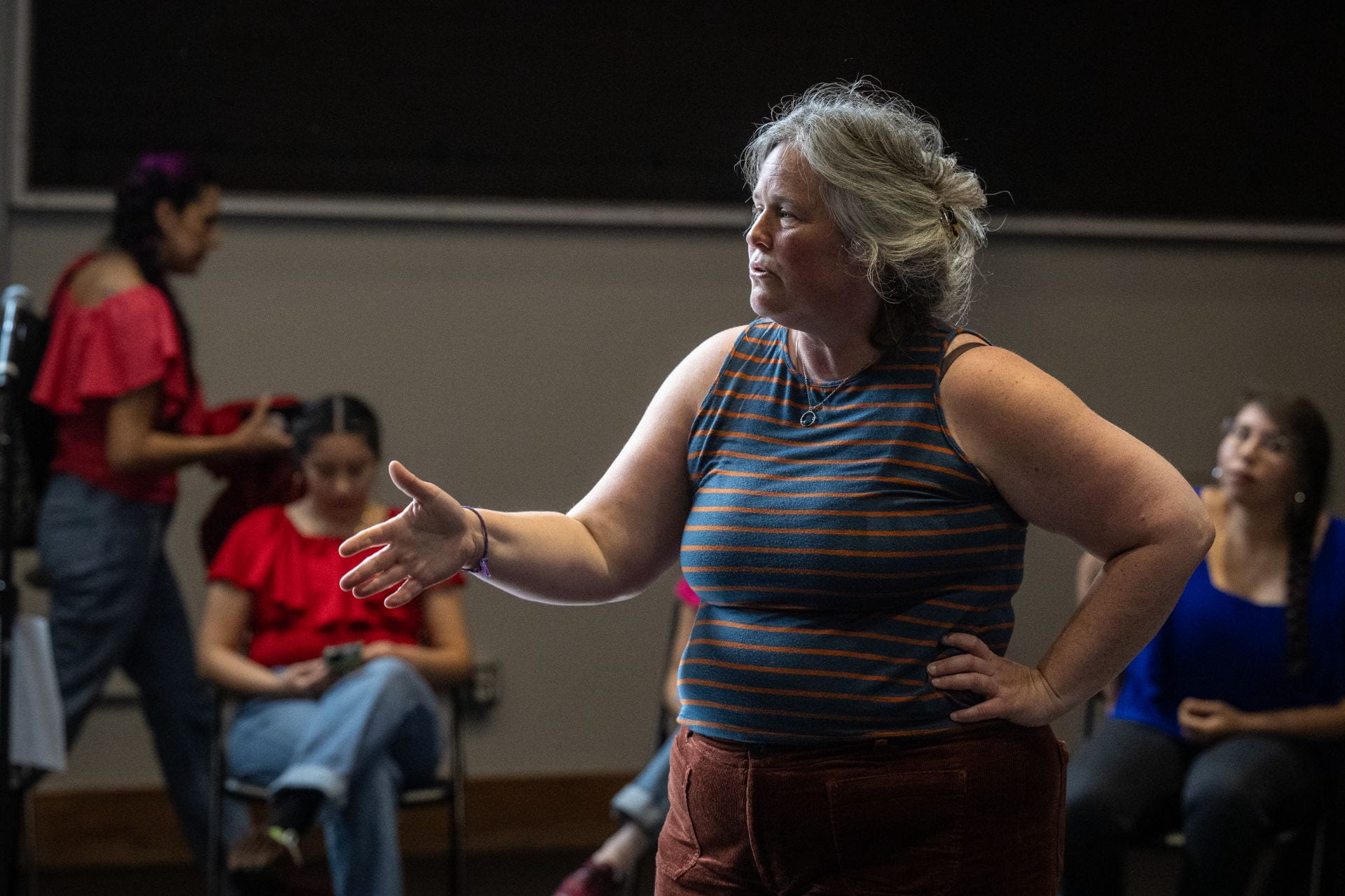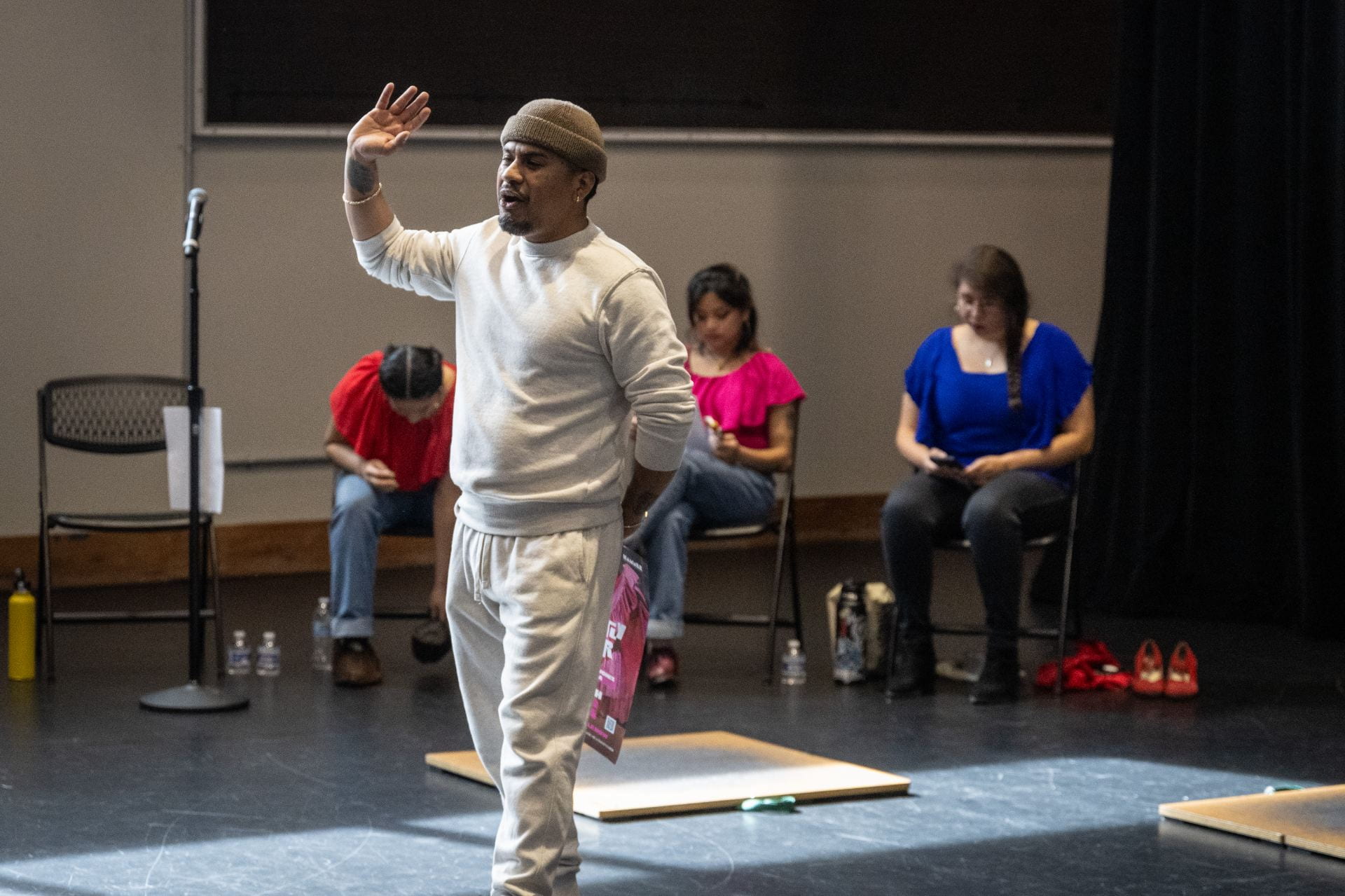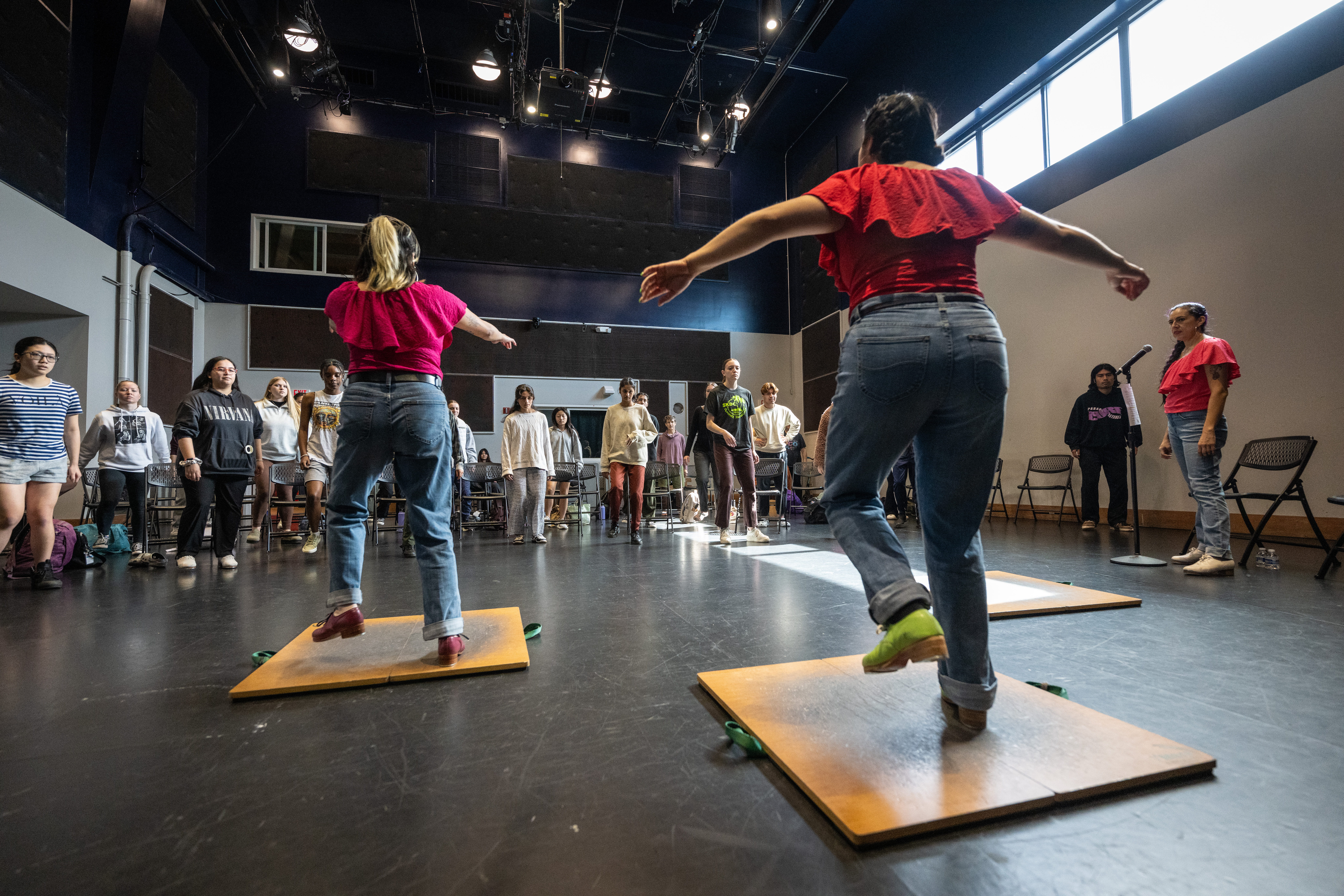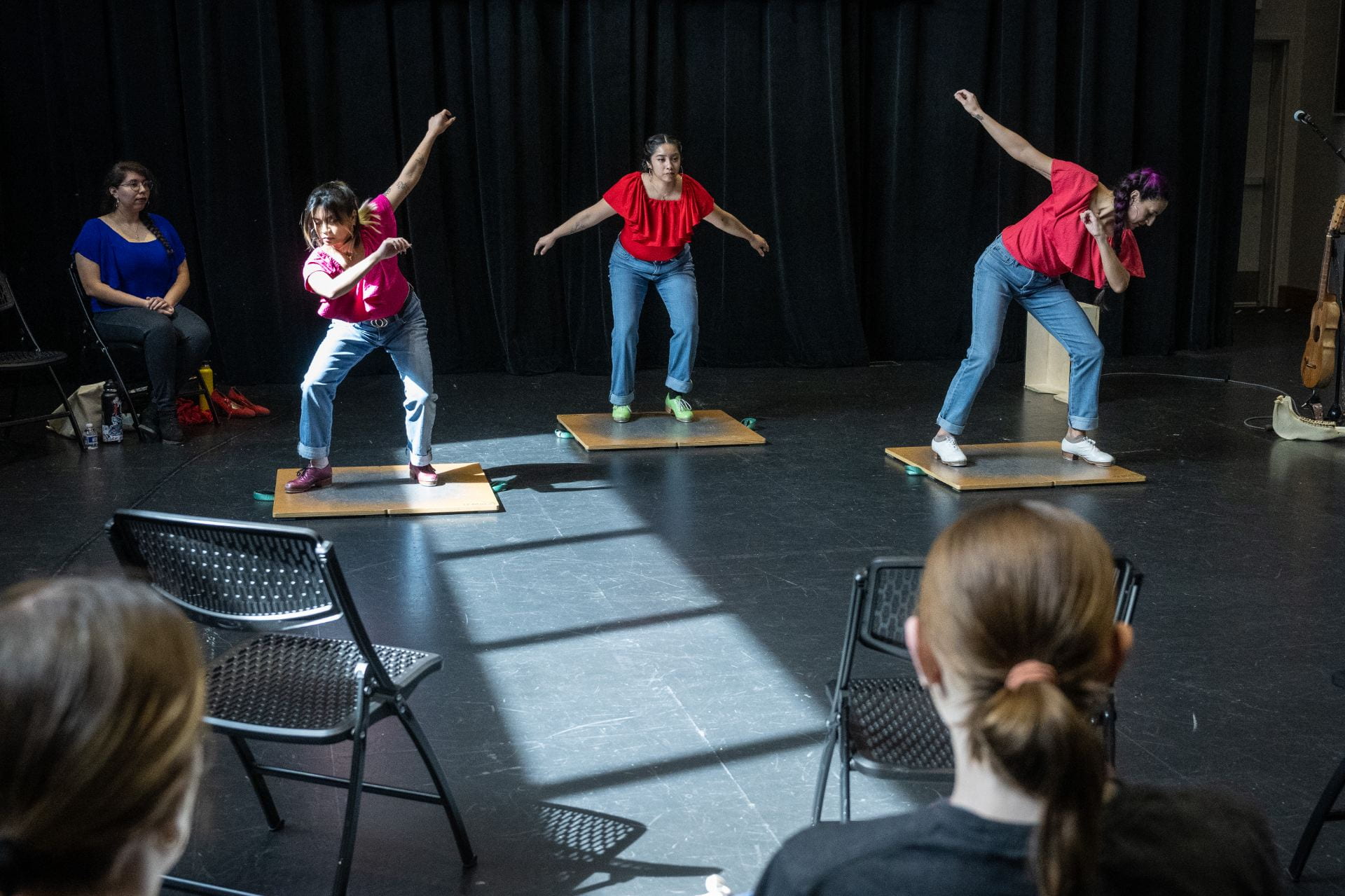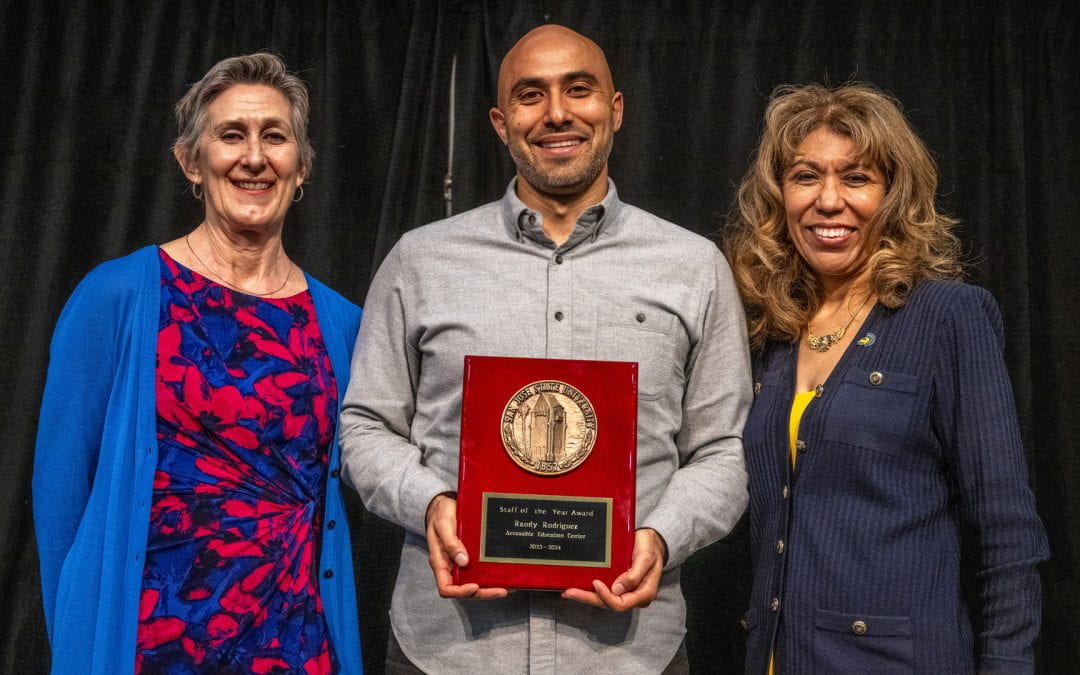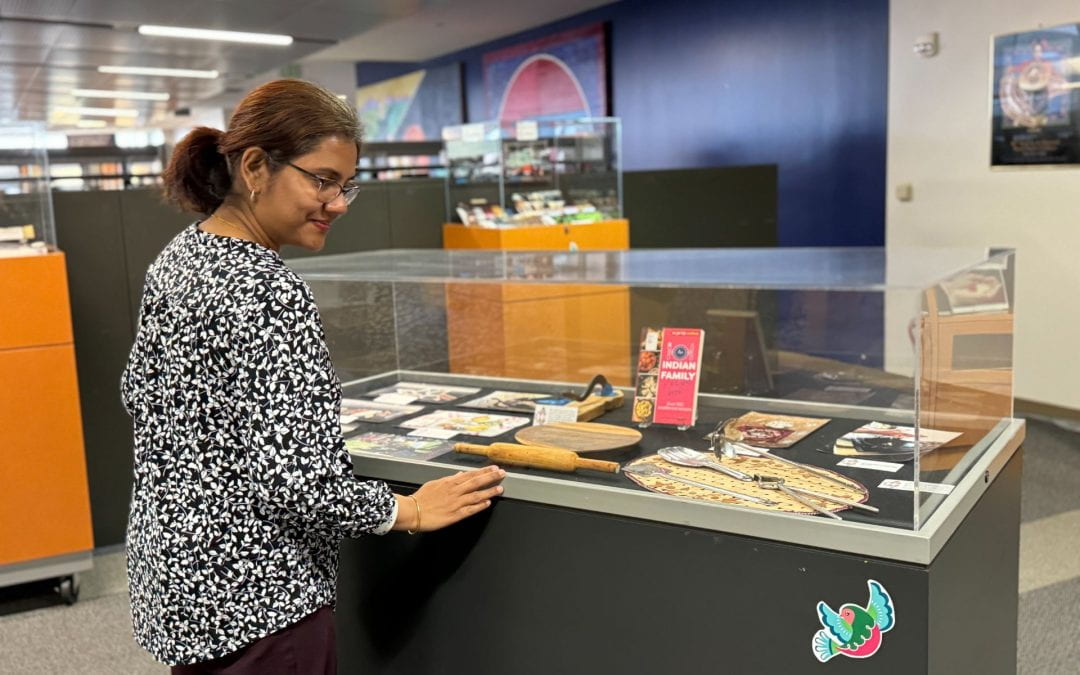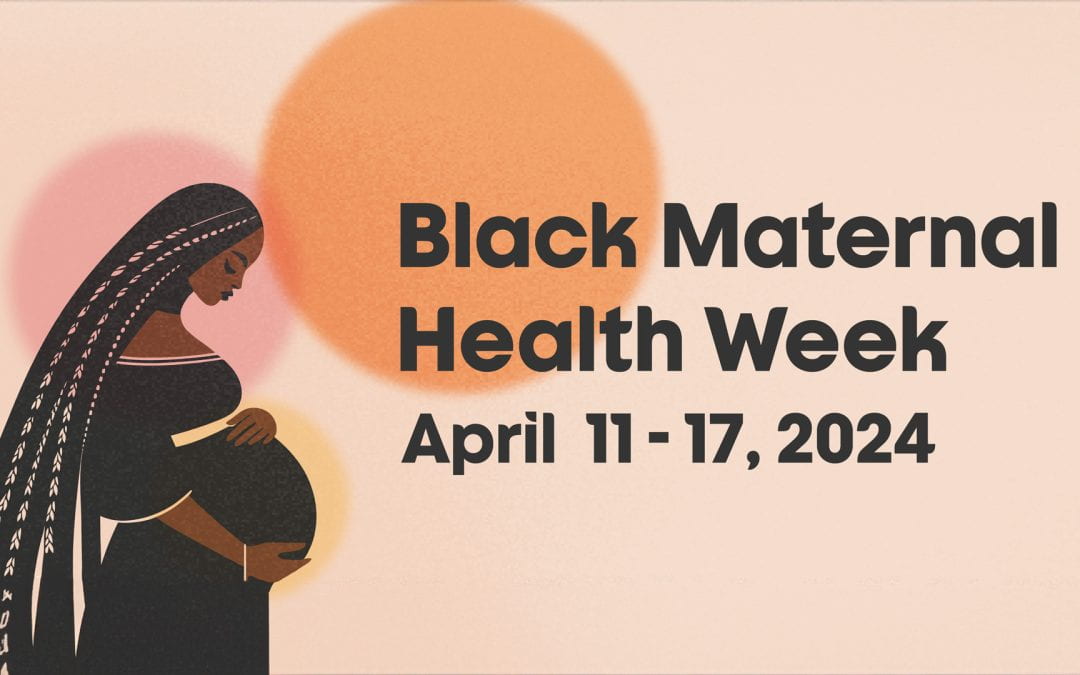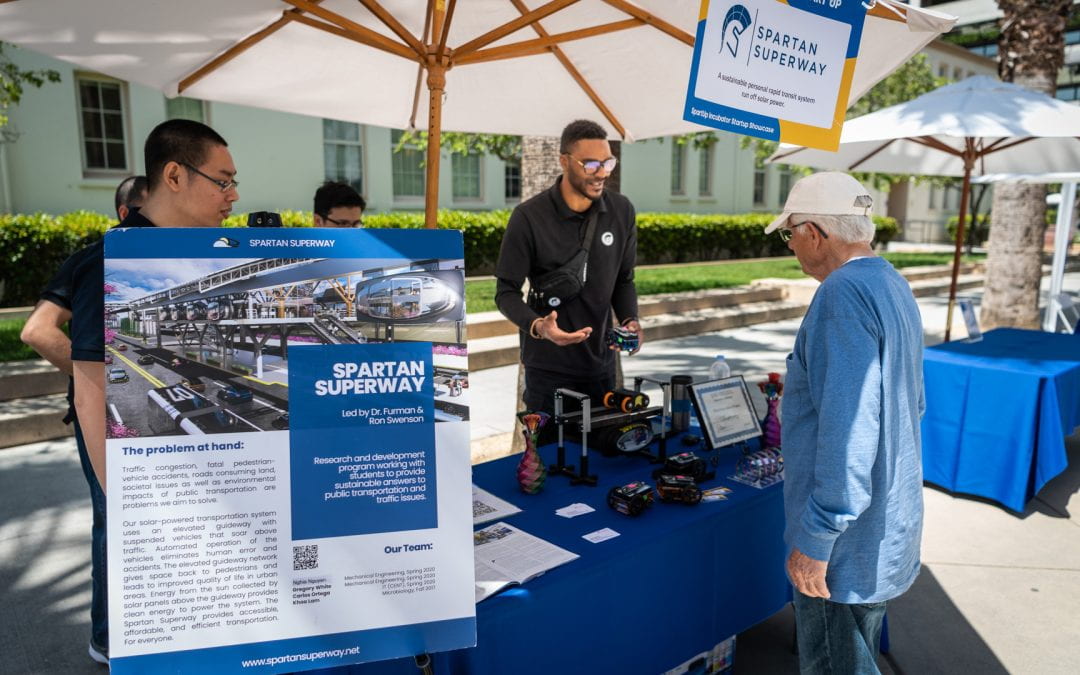“Ghostly Labor” is a Labor of Love
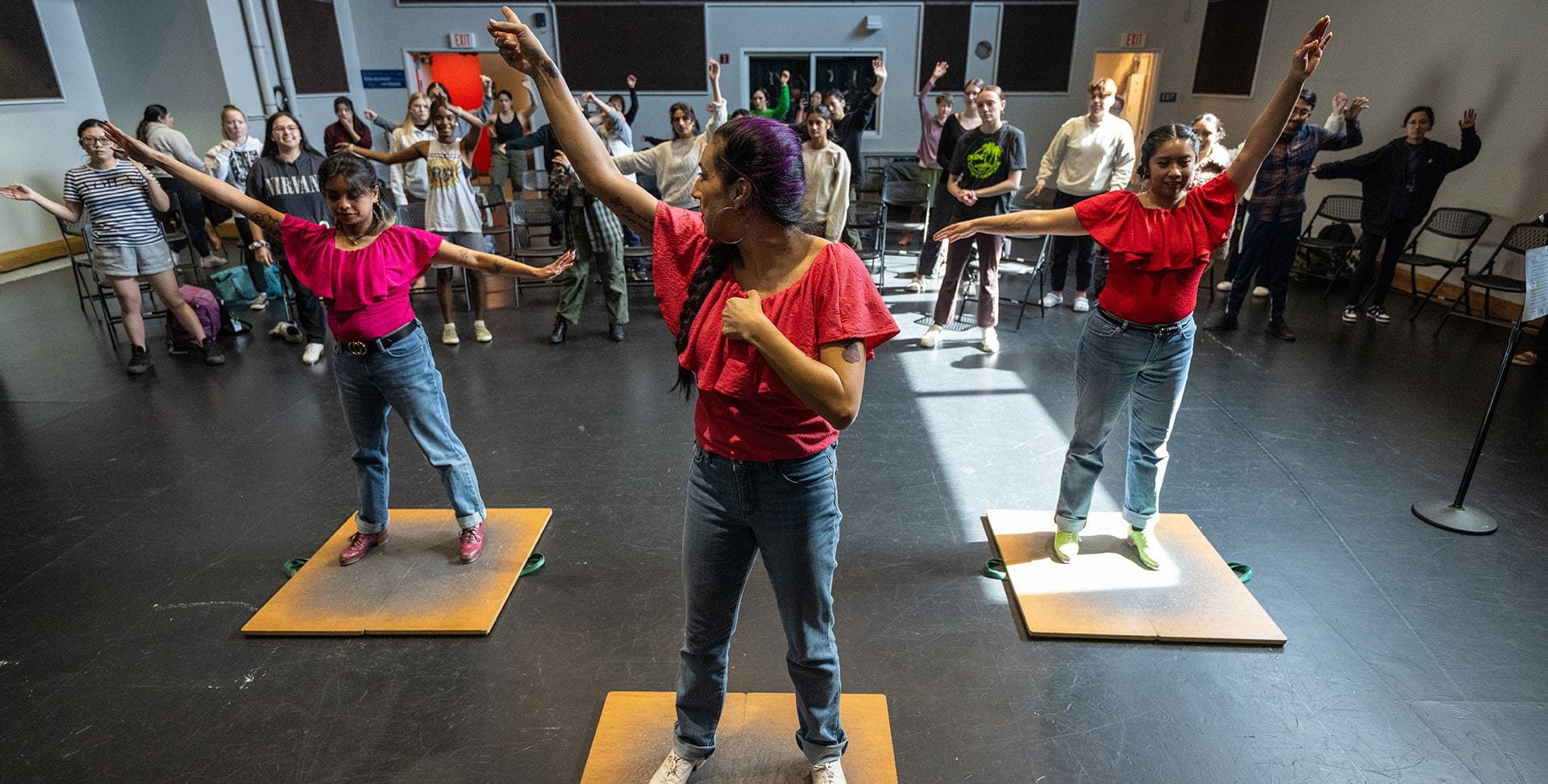
La Mezcla performers Kirsten Millan (left), Vanessa Sanchez (center) and Sandy Vazquez (right) demonstrate an excerpt of their piece “Ghostly Labor” during a master class for SJSU dancers in the Hammer Theatre. Photo by Robert C. Bain.
How can dance and music share the rich history of labor in the U.S.-Mexico borderlands with audiences? Nationally recognized Chicana-Native dancer, choreographer and educator Vanessa Sanchez will bring La Mezcla, a women-driven San Francisco-based dance and music company, to San José State’s Hammer Theatre on March 21 and 22 to perform “Ghostly Labor,” a production four years in the making. The San José native also partnered with the Movimiento de Arte y Cultura Latino Americana (MACLA) to host a unique master class for SJSU students at the Hammer Theatre on March 13, offering professional demonstrations of tap dance, Mexican Zapateado, Son Jarocho and Afro-Caribbean movement.
- Front row: Vanessa Sanchez, Sandy Vazquez, Kirsten Millan and Tanya Benítez of La Mezcla pose with SJSU dance classes at the Hammer Theatre. Photo by Robert C. Bain.
- La Mezcla executive artistic director Vanessa Sanchez plays the quijada alongside Tanya Benítez, Sandy Vazquez and Kirsten Millan. Photo by Robert C. Bain.
- Mary Elizabeth Anderson, associate dean of faculty success and research at SJSU’s College of Humanities and the Arts, introduced the master class. Photo by Robert C. Bain.
- Yosimar Reyes, poet and MACLA performing artist in residence, introduced the master class at the Hammer. Photo by Robert C. Bain.
- La Mezcla performers Kirsten Millan (left) and Sandy Vazquez demonstrate a dance technique to SJSU students in the Hammer Theatre. Photo by Robert C. Bain.
- La Mezla performing artists (left to right) Tanya Benítez, Kirsten Millan and Vanessa Sanchez demonstrate an excerpt of their work, “Ghostly Labor,” during a master class at the Hammer Theatre on March 13. Photo by Robert C. Bain.
The class featured dance demonstrations by Sanchez and fellow La Mezcla performing artists Kirsten Millan and Sandy Vazquez, who danced atop square tap dance platforms as well as a tarima, or elevated wooden platform that doubles as a musical instrument. La Mezcla singer and musician Tanya Benítez accompanied the dancers by playing a small guitar and a quijada, an instrument made out of a donkey’s jawbone and teeth. Sanchez described how the instruments, combined with rapidfire taps of the dancers’ feet, creates polyrhythmic beats that represent a mixture of Mexican, Latin American and Afro-Carribbean cultures.
“It is important that dance majors at SJSU are exposed to as many dance foms, disciplines and aesthetics as possible,” said SJSU Dance Lecturer Jenni Hong. “We have a very diverse student population; it only makes sense that we also learn from various kinds of movement disciplines, and especially the kind from an exceptional culturally-based dance artist, Vanessa Sanchez, that uses percussion, rhythm and dance to challenge cultural and gender role stereotypes.”
During the class, Sanchez and her fellow dancers divided Spartan dancers into three groups, with each one learning a different part of “Labor Relations,” a piece included in the “Ghostly Labor” performance. The joy was palpable on the students’ faces as they tapped, clapped and recreated images of laborers picking “las tres hermanas” — the squash, corn and beans that feature heavily in indigenous cuisine.
“I am thrilled about the master class with Vanessa Sanchez,” said Astha Shreeshreemal, ’26 Dance. “Her unique blend of technique and passion for dance promises an enriching experience for all of us in the dance program. I am confident that it’ll be a pivotal moment in our artistic journeys. Thank you for this incredible opportunity.”
Inspired by Sanchez’s family history, “Ghostly Labor” examines the legacy of systemic labor exploitation while celebrating the resilience and unity found in collective resistance. Sanchez originally partnered with MACLA in early 2020 on a National Endowment for the Arts-funded proposal that was forced to rehearse outside during the early days of the COVID-19 pandemic. While the plan had been to stage a full production in 2020 and 2021, Sanchez and her team pivoted to volunteering and working directly with farmworkers in the Half Moon Bay-based nonprofit Ayudando Latinos a Soñar (ALAS) (Helping Latinos Dream) for more than two years, all the while creating the short film, “Ghostly Labor: A Dance Film.”
“While touring and performing are significant, La Mezcla’s work is largely rooted in community engagement, research and education,” said Sanchez. “It is very important to me to take time to dive deeper into the cultural and historical significance of the work off the stage, while also discussing the lineages of each of the dance forms we use. I love teaching, and am really looking forward to connecting with the students from SJSU. Plus, I was born and raised in San Jose, which makes it even more exciting for me to lead this engagement in the city that taught me how to dance!”
“‘Ghostly Labor’ is an incredible project that has had this fascinating gestational period with elements that have been shared developmentally over time,” said Mary Elizabeth Anderson, associate dean of faculty success and research at SJSU’s College of Humanities and the Arts. “And MACLA has been really instrumental in helping incubate the work.”
Anderson added that the master class and presentation of “Ghostly Labor” are appearing at the Hammer during SJSU’s Chávez, Huerta, Itliong Month, which celebrates the legacies of labor rights activists César Chávez, Dolores Huerta and Larry Itliong.
“We have the César Chávez Community Action Center with this very unique mission on our campus, we have student leadership promoting CHI month, and it just so happens that ‘Ghostly Labor’ is about the history of the labor movement,” she said.
Get tickets to see “Ghostly Labor” at the Hammer Theatre March 21-22.

